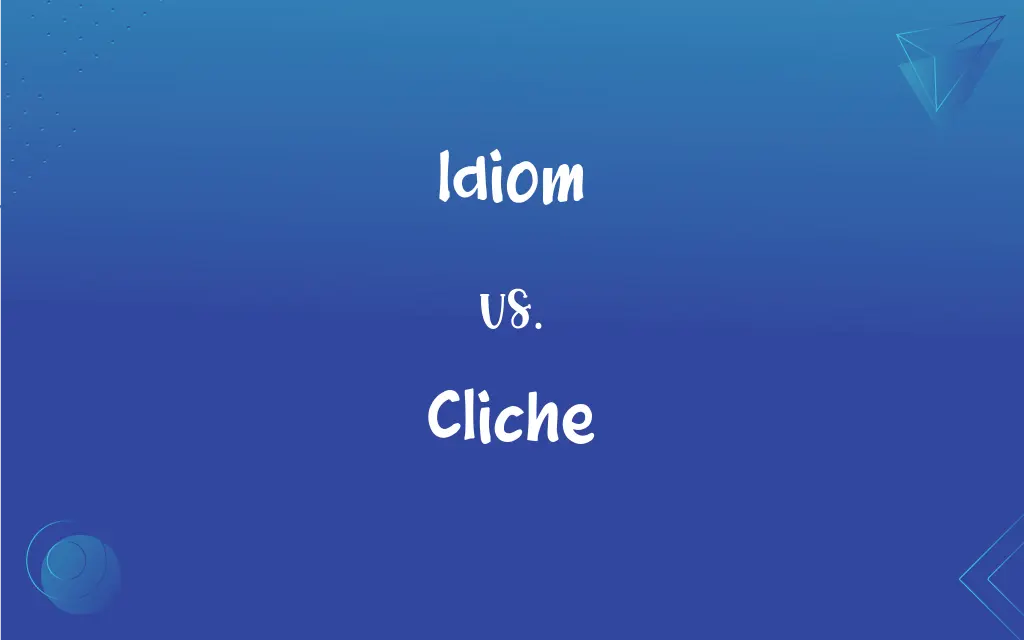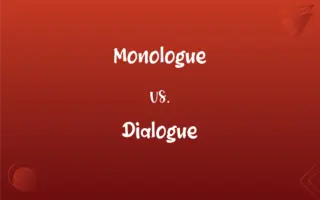Idiom vs. Cliché: What's the Difference?
Edited by Aimie Carlson || By Harlon Moss || Updated on October 23, 2023
An idiom is a phrase with a figurative meaning distinct from its literal words, while a cliché is an overused phrase or idea losing its originality.

Key Differences
An "idiom" is a unique expression specific to a language, having a meaning that can't always be deduced from the individual words. In contrast, a "cliché" is a phrase or idea that, because of overuse, has lost its freshness and impact.
For instance, the idiom "kick the bucket" means someone has passed away, not literally kicking a container. "Cliché" examples, however, might be phrases like "time will tell" or "easy as pie," which have been so commonly used they lack originality.
Another distinction is that idioms often make little sense when translated into another language, due to their culture-specific origins. A cliché, on the other hand, may be more universally understood, even if it's predictable.
Furthermore, idioms can be playful or illustrative in conveying an idea or emotion, such as "spill the beans" meaning to reveal a secret. Clichés, however, can sometimes diminish the effectiveness of communication because they're seen as trite or lazy.
While both idioms and clichés are rooted in language and culture, idioms enrich language with their figurative interpretations. Conversely, clichés might detract from the richness of communication due to their overuse.
ADVERTISEMENT
Comparison Chart
Definition
A figurative phrase unique to a language.
An overused phrase or idea.
Translation
Often loses meaning in other languages.
More universally understood.
Originality
Retains distinctiveness and cultural relevance.
Loses impact because of repetitiveness.
Function
Conveys an idea or emotion illustratively.
May weaken communication due to predictability.
Relation to Language
Enriches language with non-literal interpretations.
Can be seen as trite or lazy in communication.
ADVERTISEMENT
Idiom and Cliché Definitions
Idiom
A figurative expression distinct from its literal interpretation.
Bite the bullet means to face a difficult situation.
Cliche
A predictable expression due to excessive repetition.
At the end of the day is a common cliché in discussions.
Idiom
A language-specific phrase conveying a particular message or emotion.
The ball is in your court means the next move is yours.
Cliche
An overused phrase or idea that lacks original impact.
Saying only time will tell has become a cliché.
Idiom
A non-literal phrase that might be cultural or language-specific.
Throw in the towel means to give up.
Cliche
An expression or idea that's become mundane from overuse.
Love at first sight is a cliché in many romantic tales.
Idiom
A group of words established by usage with a meaning not deducible from individual words.
Break a leg is an idiom wishing someone good luck.
Cliche
A trite or stereotyped phrase.
Easy as pie is a cliché indicating simplicity.
Idiom
An expression whose meaning isn't predictable from its individual terms.
It's raining cats and dogs means it's raining heavily.
Cliche
A hackneyed or worn-out phrase, diminishing its effect.
Reading between the lines is an oft-used cliché.
Idiom
A speech form or an expression of a given language that is peculiar to itself grammatically or cannot be understood from the individual meanings of its elements, as in keep tabs on.
Cliche
A trite or overused expression or idea
"Even while the phrase was degenerating to cliché in ordinary public use ... scholars were giving it increasing attention" (Anthony Brandt).
FAQs
What's the main difference between an idiom and a cliché?
An idiom has a figurative meaning distinct from its words, while a cliché is overused, losing originality.
Can using clichés be harmful in writing?
Overreliance on clichés can make writing seem unoriginal or lazy.
Can an idiom become a cliché?
Yes, if an idiom is overused to the point of losing its impact, it can become a cliché.
Are all clichés unoriginal?
While clichés are overused, they might have been original or impactful when first introduced.
How does one understand the meaning of an idiom?
Context, cultural exposure, or looking it up can help decipher an idiom's meaning.
Do idioms evolve over time?
Yes, idioms can evolve, and new ones can emerge based on cultural or linguistic changes.
Are clichés universal across languages?
While the concept of a cliché is universal, specific clichés might be unique to a language or culture.
Are clichés always negative?
While often seen as lacking originality, clichés can be effective in familiar settings or for quick communication.
Why are clichés frequently used in everyday speech?
Because they're familiar and easily understood, making communication efficient.
Can a cliché be a single word?
Typically, clichés are phrases, but overused concepts or themes can also be considered clichés.
Are idioms always informal?
While idioms are common in informal speech, they can appear in formal contexts, depending on clarity and appropriateness.
Is it bad to use idioms in formal writing?
Overusing idioms in formal writing can make it seem informal or unclear to those unfamiliar with them.
Can one create a new idiom?
Yes, new idioms can arise from cultural shifts, events, or popular media, but widespread adoption is needed.
How can I learn idioms of a new language?
Engaging with native speakers, consuming local media, and cultural immersion are effective ways.
Why do some people advise against using clichés in creative writing?
Clichés might make the work seem derivative, lacking original thought or depth.
Why do idioms often lose meaning in translation?
Idioms are culturally or linguistically specific, so their figurative meanings might not exist in other languages.
Can clichés ever be useful?
In familiar settings, clichés can quickly convey ideas, but they might lack depth or originality.
What's an example of an idiom in English?
"Spill the beans" means to reveal a secret.
How are idioms formed?
Idioms often arise from cultural stories, practices, or historical events.
Do all languages have idioms?
Yes, idioms exist in all languages, reflecting cultural nuances and histories.
About Author
Written by
Harlon MossHarlon is a seasoned quality moderator and accomplished content writer for Difference Wiki. An alumnus of the prestigious University of California, he earned his degree in Computer Science. Leveraging his academic background, Harlon brings a meticulous and informed perspective to his work, ensuring content accuracy and excellence.
Edited by
Aimie CarlsonAimie Carlson, holding a master's degree in English literature, is a fervent English language enthusiast. She lends her writing talents to Difference Wiki, a prominent website that specializes in comparisons, offering readers insightful analyses that both captivate and inform.
































































